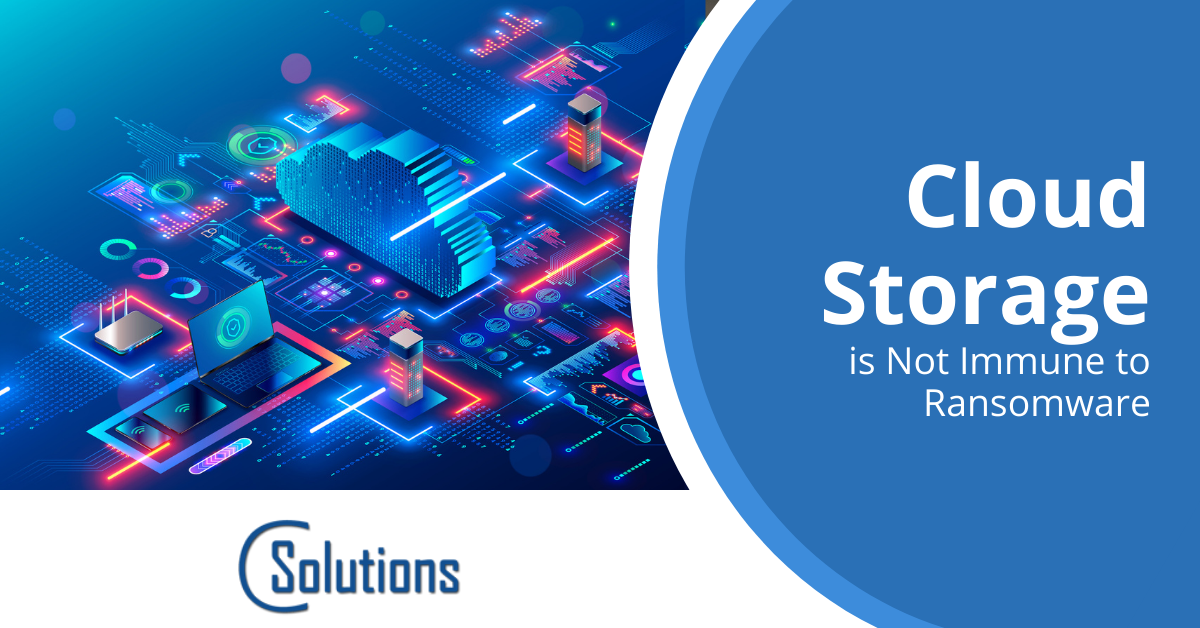Cloud Storage is Not Immune to Ransomware

Ransomware has become the most feared type of malware attack because it can essentially shut down a business quickly and cost hundreds of thousands of dollars in remediation.
Then, there is the ransom demand. It’s the only type of malware known for having a component where the attackers demand money to restore the company’s data.
On average, 56% of businesses that become victims of ransomware pay the ransom to attackers. This is why this threat keeps getting worse.
And if you think that by moving your data to a cloud service you’re going to protect it from ransomware, you are mistaken. If cloud-stored data was immune to ransomware, then this attack would be waning instead of growing because more company data is moving from on-premises to cloud platforms all the time.
Data stored in the cloud can be infected just like on-premises data. Here are a few ways that can happen:
- A PC that is syncing with a cloud service gets infected
- A user credential is compromised, the hacker then logs in as the user and uploads a ransomware-infected file
- A user downloads a malicious app on their phone, that app can then infect the device and any cloud services it is synced with
Cloud platforms make up 2 of the top 3 attack vectors for ransomware attacks. So, not only is cloud data susceptible to ransomware but it’s also being specifically targeted.
The most prevalent ransomware attack vectors include:
- Remote worker endpoint: 36%
- Cloud infrastructure/platform: 35%
- Cloud app (SaaS): 32%
- Trusted third-party: 25%
- DNS: 25%
- Software supply chain vendor: 24%
To prevent a cloud-based ransomware infection that could cripple your business, you need to incorporate the following tactics into your cybersecurity strategy.
Use a Business Password Manager
Compromised credentials are responsible for most data breaches around the world. With a lot of organizations moving their data to the cloud, hacking passwords has been the easiest way for hackers to get to that data to steal it or infect it with malware.
Users tend to make weak passwords and reuse the same password over multiple accounts (both risky behaviors) because they simply have too many passwords to deal with.
Adding a password manager can significantly improve password security because users only need to remember a single password to access all the others. They’re stored in a secure password vault that keeps them protected.
Enable MFA on All User Accounts in All Cloud Tools
Using multi-factor authentication is a must for good cloud security all around. It can block nearly all fraudulent sign-in attempts by a criminal to your cloud storage platform, even if they have the user’s password.
You can make MFA more convenient by implementing a single sign-on (SSO) solution. Just let us know if you need help doing that.
Separately Back Up All Cloud Data
If your cloud data is rendered unreadable due to a ransomware infection, you’re not going to easily be able to restore it without a separate backup. You could end up opting to pay the attackers, only to be scammed and not regain access to all your data.
It’s vital to have a separate backup copy of your cloud data in a separate system. There are cloud backup solutions designed to backup systems like Google Workspace, Microsoft 365, and others.
Even those cloud platform providers recommend backing up your data stored in their services in a 3rd party backup solution.
Leverage Persistent Data Security
Persistent data security is when a security policy stays attached to a file as it is used in different applications in the same ecosystem. Such as the sensitivity labels feature in Microsoft 365.
This allows you to attach policies, such as do not delete or do not copy to files, and those policies will stay intact whether the file is in MS Teams, MS Word, OneDrive, or another MS application.
Many companies are using platforms that have this type of file-level protection, but they haven’t leveraged it or may not even realize it’s there. Get help from a trusted IT professional, like C Solutions, to seek out and utilize these types of tools.
Enable Ransomware Protections Available on Devices & In Cloud Storage
In addition to persistent file-level protections, many cloud platforms have begun incorporating ransomware protection. You will also find these in hardware operating systems like Windows.
It’s important to enable these in both hardware and cloud storage to safeguard your files. These ransomware security features do things such as disable automated changes to a file or folder without permission. They can also detect behaviors in cloud storage consistent with ransomware and shut it down.
These protections are there, but in many cases, will not be enabled. So, you need to specifically look for them in your security settings on devices and cloud platforms and configure them.
Improve Cloud Security With Professional Configuration
C Solutions can help your Orlando area business with a custom cloud security configuration in all your platforms to ensure your data is protected from ransomware and other threats.
Schedule a free consultation today! Call 407-536-8381 or reach us online.
